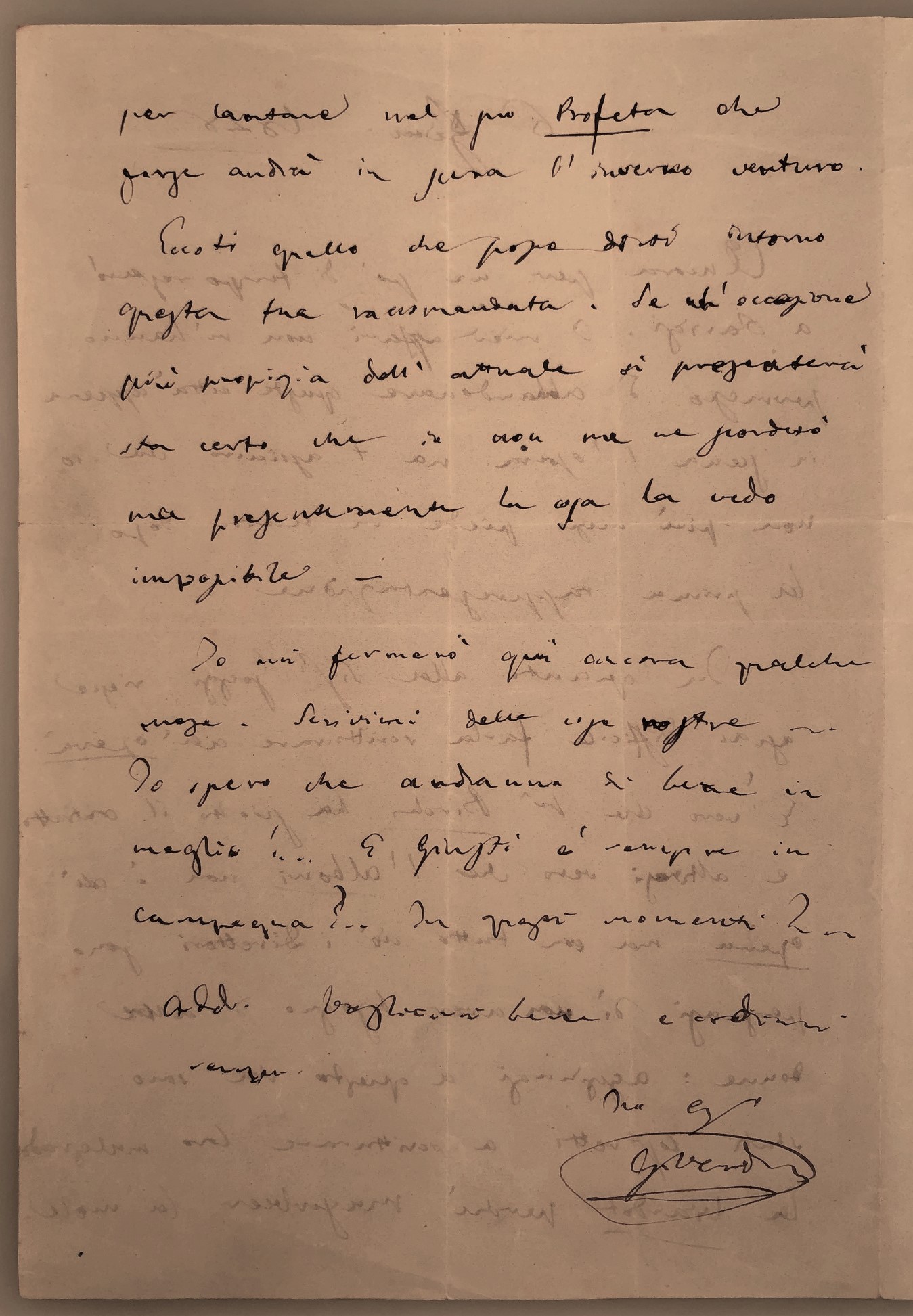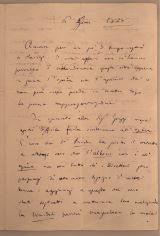VERDI, Giuseppe [1813-1901]: Autograph letter with signature. Enclosed: 2 autograph letters from Sofia Loewe and Fred. Loewe about Verdi's Attila. [Paris], 6. Januar 1848. Octavo. 2 pp. Double sheet 25.5 x 19 cm. Enclosed: 4 pp., double sheet 27,5 x 21 cm and 3 pp., double sheet 26,5 x 20,5 cm.
Artikelnummer: 27754
11000,00 €
Steuerbetrag
Standardisierter Preis / kg:
-
Verdi between supporting the fight for freedom in Italy and working on other operas Report on the premiere of "Attila" Verdi had been in Paris since the fall of 1847. After two months of rehearsals, he had seen the premiere of the reworked "Lombards" under the new title "Jerusalem" on November 26, 1847, with moderate success, and was currently trying "to bring Attila to a close in a miserable state of health" (letter Verdi to F.M. Piave, January 14, 1848). In addition, he was working at this time on the opera "Il Corsaro", which he quickly wrote down with little desire, because he felt forced to do so by the Milanese publisher Francesco Lucca and therefore felt so offended that he called Lucca a "horndog". From this life situation it follows that Verdi explains in his letter, at the beginning and at the end, that he had to stay in Paris for a while and that he thought he would be able to return to Italy only after the first performance of his opera. However, political developments in Italy, especially the uprisings in Milan starting on March 18, 1848, prompted Verdi, who was enthusiastic about the idea of freedom, to change his plans and travel to Italy as early as the end of March to support the struggle of independence there against Austrian rule (cf. Verdi's letter to F.M. Piave of April 21, 1848). Regarding the musical life in Paris, Verdi reports in his unpublished letter, among other things, that his colleague Meyerbeer would like to engage the mezzo-soprano Pauline Viardot-Garcia (1821-1910), who celebrated triumphant successes on all opera stages in Europe, for his new opera "Le Prophète", which he assumed would be performed in the coming winter, but this did not happen until 16th of April 1849 at the Paris Opera. Regarding his commitment to the soprano Emilia Goggi (1817-1857), who had appeared as Abigaille in "Nabucco" in 1845 and as Elvira in "Ernani" in 1846, Verdi explained that it was rather difficult to arrange an engagement at the Paris Opera for this artist, whom he held in high esteem. Even assuming that the opera singer Marietta Alboni was no longer at the opera, Verdi regrets that the directors of the opera were unfortunately convinced that they did not need other women. Full transcription and translation of this letter is available. - Not in Cesari/Luzio: Copialettere di G. Verdi. The enclosed letter, dated Dec. 14, 1845, is written in French by the soprano Sofia Loewe (1815-1866), one of the most famous German opera singers of her time, and addressed to Adolphe Doria in Milan. Loewe was enthusiastically acclaimed by the audience at the premiere in Venice at the Teatro La Fenice on March 9, 1844, for her role as Elvira in Verdi's opera "L'Ernani." Verdi was so impressed by her artistry that he wrote a major role (Odabella) for her in his opera Attila in 1846. The famous soprano proudly reports that Verdi promised her to compose a "cavatine" for her and praises him for his masterful handling of the singing voices: "Verdi il m'a promis de m'ecrire une cavatine - vous mème etait mon assistant, nous avrat fait le plus belle frases da monde ..." The second enclosed letter is a special eyewitness account of the first performance of Verdi's opera "Attila" that had taken place at the Teatro La Fenice in Venice on March 17, 1846. It is written by Fred. Loewe, the singer's brother, three days after the premiere in Venice on March 20, 1846, and also addressed to Adolphe Doria. Still in the throes of the great success of the premiere, Loewe gives a detailed account of the opera, the performance, his sister's role, and how Verdi was celebrated by the audience several times after each act. VERDI ZWISCHEN UNTERSTÜTZUNG DES FREIHEITSKAMPFES IN ITALIEN UND DER ARBEIT AN WEITEREN OPERN BERICHT ÜBER DIE URAUFFÜHRUNG VON "ATTILA" Verdi befand sich seit Herbst 1847 in Paris, hatte nach zweimonatigen Proben am 26.11.1847 die Uraufführung der umgearbeiteten "Lombarden" unter dem neuen Titel "Jerusalem" mit mäßigem Erfolg erlebt und bemühte sich gerade "den Atila in einem erbärmlichen Gesundheitszustand zu Ende zu bringen" (Brief Verdi an F.M. Piave vom 14.1.1848). Zudem arbeitete er in dieser Zeit an der Oper "Il Corsaro", die er mit wenig Lust schnell herunterschrieb, weil er sich hierzu vom Mailänder Verleger Francesco Lucca dazu gezwungen sah und sich daher so beleidigt fühlte, dass er Lucca als "Hornochsen" betitelte. Aus dieser Lebenssituation heraus ergibt sich, dass Verdi in seinem Brief anfangs und am Schluss erklärt, noch etwas in Paris bleiben zu müssen und erst nach der ersten Aufführung seiner Oper meint, nach Italien zurückkommen zu können. Die politische Entwicklung in Italien, insbesondere die Aufstände in Mailand ab 18. März 1848 haben den vom Freiheitsgedanken begeisterten Verdi aber dazu bewegt, seine Pläne zu ändern und schon Ende März nach Italien zu reisen, um den Kampf der Unabhängigkeit dort gegen die österreichische Herrschaft zu unterstützen (vgl. hierzu Verdis Brief an F.M. Piave vom 21.4.1848). Über das Pariser Musikleben berichtet Verdi in seinem unveröffentlichtem Brief u.a., dass sein Kollege Meyerbeer gerne die Mezzosopranistin Pauline Viardot-Garcia (1821-1910), die auf allen Opernbühnen Europas triumphale Erfolge feierte, für seine neue Oper "Le Prophète" engagieren würde, von der er annahm, dass diese im kommenden Winter aufgeführt werden würde, was dann aber erst am 16.4.1849 in der Pariser Oper geschah. Bezüglich seines Einsatzes für die Sopranistin Emilia Goggi (1817-1857), die 1845 als Abigaille in "Nabucco" und 1846 als Elvira in "Ernani" aufgetreten war, erklärt Verdi, dass es doch ziemlich schwierig sei, für diese, von ihm sehr geschätzte Künstlerin, ein Engagement an der Pariser Oper zu vermitteln. Auch unter seiner Annahme, dass die Opernsängerin Marietta Alboni nicht mehr an der Oper sei, bedauert Verdi es, dass die Direktoren der Oper leider davon überzeugt seien, keine anderen Frauen zu brauchen. Vollständige Transkription und Übersetzung des Briefes ist vorhanden. Nicht in Cesari/Luzio: Copialettere di G. Verdi. Der beiliegende Brief vom 14.12.1845 ist von der Sopranistin Sofia Loewe (1815-1866), eine der berühmtesten deutschen Opernsängerinnen ihrer Zeit, in französischer Sprache verfasst und an Adolphe Doria in Mailand gerichtet. Loewe wurde bei der Uraufführung in Venedig im Teatro La Fenice am 9. März 1844 für ihre Rolle als Elvira in Verdis Oper "L'Ernani" vom Publikum begeistert gefeiert. Verdi war von ihrer Kunst so beeindruckt, dass er 1846 eine große Rolle (Odabella) für sie in seine Oper Attila schrieb. Mit Stolz berichtet die berühmte Sopranistin, dass ihr Verdi versprochen hat, für sie eine "cavatine" zu komponieren und lobt ihn für seinen meisterlichen Umgang mit den Singstimmen: "Verdi il m'a promis de m'ecrire une cavatine - vous mème etait mon assistant, nous avrat fait le plus belle frases da monde ..." Der zweite beiliegende Brief ist ein besonderer Augenzeugenbericht über die Uraufführung von Verdis Oper "Attila", die am 17.März 1846 im Teatro La Fenice in Venedig stattgefunden hatte. Er ist von Fred. Loewe, dem Bruder der Sängerin, drei Tage nach der Uraufführung vom 20. März 1846 in Venedig verfasst und ebenfalls an Adolphe Doria gerichtet. Noch ganz im Rausch des großen Erfolgs der Uraufführung, berichtet Loewe ausführlich über die Oper, die Aufführung, die Rolle seiner Schwester und wie Verdi mehrmals nach jedem Akt vom Publikum gefeiert wurde.





